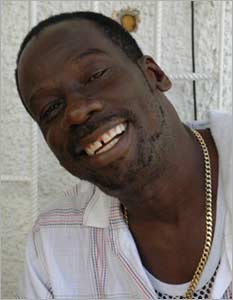 Leroy Sibbles (born January 29, 1949) is a Jamaican-Canadian reggae musician and producer. He was the lead singer for The Heptones in the 1960s and 1970s.
Leroy Sibbles (born January 29, 1949) is a Jamaican-Canadian reggae musician and producer. He was the lead singer for The Heptones in the 1960s and 1970s.
In addition to his work with The Heptones, Sibbles was a session bassist and arranger at Clement “Coxsone” Dodd’s Jamaica Recording and Publishing Studio and the associated Studio One label during the prolific late 1960s, and was described as “the greatest all-round talent in reggae history” by Kevin O’Brien Chang and Wayne Chen in their 1998 book Reggae Routes.
The son of a grocer, Sibbles began singing in the 1950s and also played guitar, having been taught by Trench Town Rastas Brother Huntley and “Carrot”. Barry Llewellyn and Earl Morgan had formed The Heptones in 1958, and Sibbles was in a rival group along with two friends. Sibbles joined The Heptones in 1965 after the two groups competed in a street-corner contest.
The trio made their first recordings for Ken Lack in 1966 with “School Girls” and “Gun Man Coming to Town”, the latter the A-side of their début single. Though the songs did not achieve hit status, the latter composition made the playlists at Radio Jamaica Rediffusion (RJR). They moved on to Clement “Coxsone” Dodd’s Studio One where they stayed until 1971.
The Heptones were among the most influential groups of the rock steady era, along with The Pioneers, The Gaylads, The Paragons, The Uniques, and The Techniques. Signature Heptones songs included “Baby”, “Get in the Groove”, “Ting a Ling”, “Fattie Fattie”, “Got to Fight On (To the Top)”, “Party Time”, and “Sweet Talking”. The group’s Studio One output has been collected on albums The Heptones, On Top, Ting a Ling, Freedom Line, and the Heartbeat Records anthology, Sea of Love.
Studio One
Beyond his work as a singer-songwriter, Sibbles contributed to the collective output of Studio One as a bass player during the late 1960s. Keyboardist and arranger Jackie Mittoo encouraged Sibbles to play the bass when he needed a bassist for his Jazz trio.
When Mittoo left full time duties at Studio One, Sibbles auditioned singers, arranged sessions, sang harmony, and played bass as a part of the studio group variously known as the Sound Dimension and Soul Vendors. These musicians, with engineering supervision Sylvan Morris, played backing tracks used by vocalists Bob Andy, Alton Ellis, Horace Andy, Carlton Manning, The Abyssinians, The Gladiators, Willi Williams, Ken Boothe, John Holt, Burning Spear, Dennis Brown, Slim Smith, and scores of others.
Sibbles was a contributor to tracks including “Freedom Blues” (which evolved into the Jamaican rhythm known as “MPLA”) by Roy Richards, “Love Me Forever” by Carlton & The Shoes, “Satta Massagana” and “Declaration of Rights” by the Abyssinians, “Stars” and “Queen of the Minstrels” by The Eternals, “Ten to One” by the Mad Lads, “Door Peep (Shall Not Enter)” by Burning Spear, and the instrumental “Full Up”, which was used by Musical Youth for their huge worldwide hit “Pass The Dutchie”.
Because of the Jamaican process of versioning and the liberal recycling of rhythms in subsequent years, many of the songs, rhythms, and melodies written and recorded during the rocksteady era, the aforementioned in particular, continue to be referenced today. The most frequently referenced of Sibbles’ bass lines is that found on the instrumental “Full Up”, popularized internationally by Musical Youth’s recording of “Pass the Dutchie”, an adaptation of The Mighty Diamonds’ “Pass the Kutchie”.
Sibbles’ legacy also endures in Horace Andy’s tribute to him, “Mr. Bassie”. (While Sibbles has been credited with the original “Real Rock” bassline, this was more likely performed by Boris Gardiner.) The bass parts Sibbles and others developed in rocksteady utilized a rhythmic space found in later roots reggae, where the notes were not necessarily played or sustained on each downbeat of a 4/4 measure. Sibbles has explained that his style was to lag the downbeat slightly.
Other musicians involved in the Studio One rock steady sessions included Richard Ace and Robbie Lyn on keyboards; Bunny Williams, Joe Isaacs, and Fil Callendar on drums; Eric Frater and Ernest Ranglin on guitar; and the horn section of Felix “Deadly Headley” Bennett on saxophone and Vin Gordon (a.k.a. “Don D. Jr.”) on trombone.
